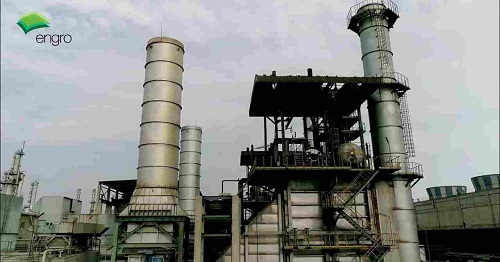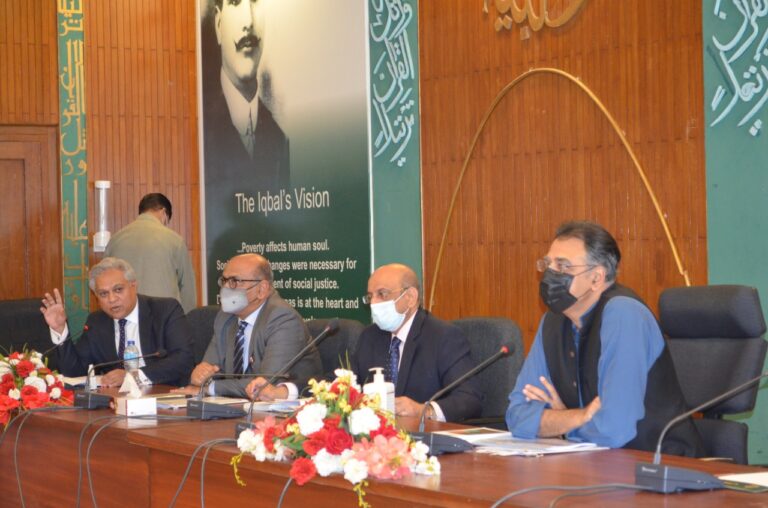Pakistan Seeks China’s Support in IMF Program
Staff Report
Washington DC: Pakistan has sought support from China for the larger and extended IMF program.
The Federal Minister for Finance and Revenue, Mr. Muhammad Aurangzeb, met with the Chinese Finance Minister, Mr. Lan Fo’an, on the sidelines of the IMF/World Bank Spring Meetings in Washington D.C.
Pakistani finance minister informed the Chinese Minister that Pakistan was entering into a larger and extended program with the International Monetary Fund (IMF) and looked forward to China’s continued support.
He reaffirmed Pakistan’s unwavering commitment to ensuring the safety and security of Chinese citizens and investments in the country.
He lauded China’s invaluable contribution to Pakistan’s development through initiatives such as the China-Pakistan Economic Corridor (CPEC) and support at international financial institutions.
Apprising the Chinese counterpart of the progress on CPEC, the Finance Minister stated that Phase I focused on infrastructure development, while Phase II would emphasize monetizing assets through the operationalization of Special Economic Zones and relocation of Chinese Private-Owned Companies (POCs).Can China Easily Give Up CPEC in Pakistan?
He expressed the government’s resolve to accelerate Phase II of CPEC. The Finance Minister also expressed gratitude to the Chinese government for the SAFE deposits and their regular roll-overs, which have played a crucial role in addressing Pakistan’s external financing gaps.
He informed the Chinese Minister that Pakistan was entering into a larger and extended program with the International Monetary Fund (IMF) and looked forward to China’s continued support.
He also briefed him on the government’s priorities, including broadening the tax base, fixing the energy sector, and overhauling the state-owned enterprises (SOEs).
He stated that Pakistan aimed to tap into the Chinese Bond Market and launch Panda Bonds during the fiscal year 2025-26. Both sides agreed on the need to continue their cooperation within international institutions, reflecting deep-rooted economic ties between the two countries.
The Finance Minister also met with Mr. Martin Raiser, the World Bank’s Regional Vice President for South Asia, to discuss Pakistan’s reform initiatives and development priorities.
During the meeting, the Finance Minister expressed satisfaction that the new Country Partnership Framework (CPF) between Pakistan and the World Bank would be finalized soon.
He underlined the government’s reform thrust in the areas of energy, taxation, and state-owned enterprises (SOEs), highlighting the pursuit of both short and long-term goals in these crucial sectors.
Referring to his earlier meetings with the Senior Leadership of the World Bank, the Finance Minister stated that the Bank’s focus on climate change, digitalization, and human capital development aligns well with the priorities of the government.
The Finance Minister highlighted the government’s vision to realize Pakistan’s true economic potential in terms of sustainable economic growth.
He stressed the importance of timely completion of development projects and the realization of intended impacts and outcomes, emphasizing the need for effective implementation and monitoring.
He also briefed Mr. Raiser on the role of the Special Investment Facilitation Council (SIFC) as a one-window facility for investment promotion and facilitation.
Both sides agreed on the need for reforms in the agriculture sector, water management, and waste-water treatment.
Finance Minister met with Mr. Brent Neiman, Deputy Under Secretary for International Finance at the U.S. Department of Treasury, on the sidelines of the IMF/World Bank Spring Meetings in Washington D.C.
The Finance Minister briefed Mr. Neiman on Pakistan’s positive economic indicators in the wake of the Stand-By Arrangement (SBA) signed with the International Monetary Fund (IMF).
He informed that the government has prioritized reforms in taxation, energy sector, and state-owned enterprises (SOEs). He underscored the United States’ significance as Pakistan’s largest trading partner and a key source of remittances and Foreign Direct Investment (FDI).
He briefed Mr. Neiman on the role of the Special Investment Facilitation Council (SIFC) in facilitating foreign investment into the country.
The Finance Minister welcomed his visit to Pakistan after the presentation of the budget and assured full support in this regard.
The Finance Minister, Mr. Muhammad Aurangzeb, held a meeting with Mr. Jin Liqun, President of the Asia Infrastructure Investment Bank (AIIB), to discuss Pakistan’s economic trajectory and explore avenues for enhancing cooperation in infrastructure development.
During the meeting, the Finance Minister briefed the AIIB President on Pakistan’s positive economic indicators, including improving foreign exchange reserves, a stable currency, declining inflation rates, and a surging stock market.
He highlighted the renewed institutional and foreign inflows into the market, on the back of the successful 9-month Stand-By Arrangement (SBA) with the International Monetary Fund (IMF).
The Finance Minister informed Mr. Jin Liqun that Pakistan was looking to enter into a larger and extended program with the IMF, building upon the progress achieved under the SBA.
He identified broadening the tax base, fixing the energy sector, and undertaking state-owned enterprise (SOE) reforms as key priorities of the government.
Finance Minister expressed gratitude for AIIB’s support in the aftermath of the devastating 2022 floods, particularly the co-financing of US$ 250 million for the RISE-II program of the World Bank.
He reaffirmed Pakistan’s commitment to continue working closely with AIIB on the infrastructure development of the country.
He appreciated AIIB’s additional commitment of US$ 500 million in project assistance and acknowledged the satisfactory progress on project implementation and disbursements.
The Finance Minister met with Mr. Makhtar Diop, Managing Director of the International Finance Corporation (IFC). In the meeting, the Finance Minister briefed Mr. Diop on Pakistan’s positive economic indicators, including improving foreign exchange reserves, stable currency, declining inflation rates, and a surging stock market.
He highlighted the renewed institutional and foreign inflows into the market, bolstered by the successful 9-month Stand-By Arrangement (SBA) with the International Monetary Fund (IMF).
He informed the IFC Managing Director that Pakistan looked forward to entering into a larger and extended program with the IMF.
The Finance Minister identified broadening tax reforms, fixing the energy sector, and undertaking state-owned enterprise (SOE) reforms as key priorities of the government.
He expressed gratitude to IFC for its support in the outsourcing of the Islamabad airport, which will be followed by similar initiatives in Lahore and Karachi.
He noted with satisfaction the uptick in IFC activities in the country and requested the corporation’s support in assisting the government in shifting its Public Sector Development Program (PSDP) to PPP mode.
Other engagements of the Finance Minister included a luncheon meeting with the Country Management Unit (CMU) of the World Bank, participation in the High-level Closed-door Roundtable on Financial Markets Access: Challenges and Opportunities organized by the Middle East and Central Asia Department (MCD), IMF and meeting with Mr. Andrew Torre, Regional President, VISA.
The Finance Minister is leading Pakistan’s delegation in the IMF / World Bank’s 2024 Spring Meetings being held in Washington DC. Other delegates include Mr. Imdadullah Bosal, Finance Secretary, Dr. Kazim Niaz, Secretary Economic Affairs Division, Mr. Jameel Ahmed, Governor of State Bank of Pakistan, and Mr. Adil Akbar Khan, Senior Joint Secretary, Economic Affairs Division








